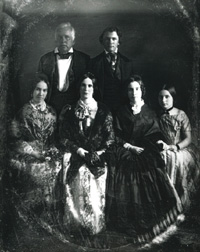Oliver Bliss Hayes came to Nashville around 1808. He was born in So. Hadley, MA, the son of a preacher. His Father, Joel, was reputed to be a participant in the Boston Tea Party. He left to find his fortune and he did - working for several years in Baltimore before arriving in Nashville with plenty of money and about 2 dozen slaves. He became a wealthy and powerful member of the community, married well, as did his children, to prominent local families. He acquired from Judge John Childress the Rokeby mansion and ~1280 acres in Nashville SW of downtown near the current Vanderbilt and Peabody University campuses. In 1875, post Hayes ownership, Rokeby became the first dorm for Vanderbilt University. It was razed by it's owners, the Methodist Church, to build offices in 1947. Workers expressed concern since it had been said to be haunted.
A more complete biography of Oliver Bliss Hayes is on the website for Belmont Mansion, the home of his daughter Adelicia. That website has extensive information on the family, history of the era, etc. Click on the History link on the top of the page for subtopics, all of which are very interesting.
For more on the early history of the Hayes family, see the book George Hayes of Windsor and his Descendants, available in reproduction on Amazon. And on Google Books. George was born in Scotland, lived for a short time with relatives in England before sailing to Windsor, CT, arriving in 1682. The family history is good reading!
My branch of the family (summary):
Oliver Bliss Hayes, I (1783-1858), m. Sarah Clements Hightower (1796-1871)
Oliver Bliss Hayes, II (1825-1868), m. Emily McGavock (1830-1920)
Henry Martyn Hayes b: 17 Feb 1832 d: 26 JAN 1884, Mary Lemira Boyd b: 12 OCT 1836 d: 12 OCT 1875
Oliver Hightower Hayes, Sr (1857-1916), m. Fannie Tucker (1857- 1899 )
Oliver Hightower Hayes, Jr. (1880-1960), m. Cora Travis (1886 - 1937)
Claude William (my father) (1913-1997), m. Eva Christine Burris (1918-1984): Claude William Jr. (1944- ), James Edward (Jim - me) (1946 - )
Lillie Claire (? -2010) m. Vic McAlpin: Linda, Tavara, Vicky
Myrtle, m. Fred Winkie: Mary Ann, Bunkie (?)
Hayes Family Bible, with notes and death notices.
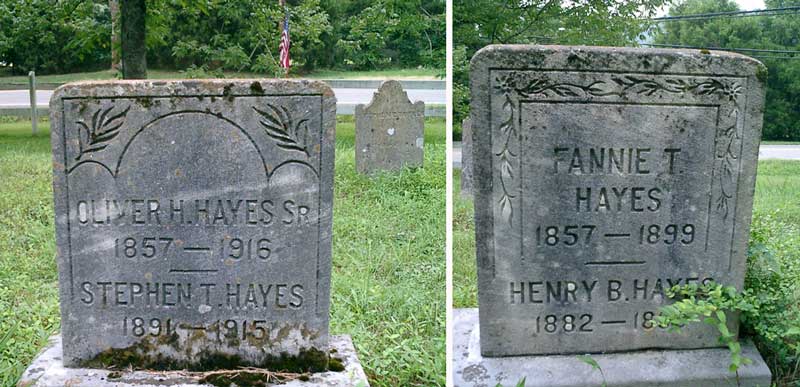
Oliver Hightower Hayes Sr. and his wife Fanny Tucker Hayes are buried in an obscure family cemetery on Granny White Pike just N of Oman Drive.
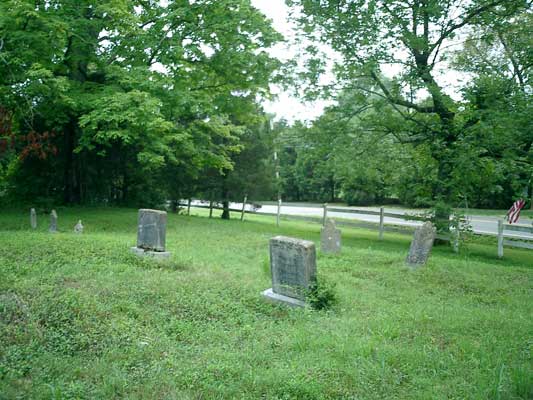
Oliver
Bliss Hayes Family (c. 1846)
(click on the
photo for a large version)This photo is in the Tennessee State Library and Archives: http://tnportraits.org/30173-hayes.htm
In the photo:
Laura Hayes (1829-1892),
Sarah Clements Hightower Hayes (1793-1871), OB’s wife m 1811
http://tnportraits.org/30172-hayes.htm
Adelicia Hayes Franklin (1817-1887), see below
http://tnportraits.org/84161-hayes-adelicia.htm
Aureli N. Hayes (1830-1850),
Oliver Bliss Hayes, I (1783-1858), [probably]
Oliver Bliss Hayes, II (1825-1868).
A daughter not in the photo:
Corinne Hayes m. (1855) William Luther Bigelow Lawrence (1828-1902)
3 sons not shown:
Richard Hightower Hayes (1813-63),
Joel Addison Hayes (1815-90), m. Margaret Davis
Henry Martyn Hayes (1832-84). M. Mary Lemira Boyd (1836-1875) and lived in Ensworth on Hayes St. near what is now St. Thomas Hospital.
http://tnportraits.org/30170-hayes.htm
Portraits:
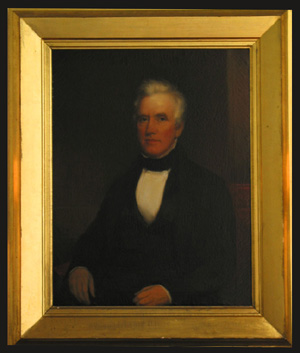
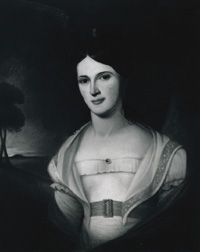
Oliver and Sarah
I've tracked down info on most of the family, except no information was found on Aureli. According to the information on the photo page, she died at age 20.
Corinne
Corinne m. (1855) William Luther Bigelow Lawrence (1828-1902) a lawyer who managed their home "Hillside" then became a school teacher The Lawrence family were also from MA and arrived in TN in 1808.
Laura
Laura married George Washington Shields.
Couldn’t find much on them, but this may be relevant: Col. Hamp" Tipton had his house built in the early 1870s. We saw the Tipton name on some of the gravestones at the Methodist church. The Carter Shields cabin was built on land he bought in 1910. A wound suffered in the Battle of Shiloh left George Washington "Carter" Shields crippled for life. (This historical information is taken from the booklet "Cades Cove Tour" obtained in the Park. )
George Washington Carter Shields was from Cades Cove but like many men in the civil war found himself taken from his home town fighting fellow Americans in far way places. In April of 1862 he fought in the infamous Battle of Shiloh where he was seriously wounded and became crippled for life. George Washington Carter Shields married shortly after the war (Laura would have been in her 30s) and left his home in Cades Cove Tennessee with his wife and moved to Kansas where he lived until 1906.
Oliver Bliss II
Oliver Bliss Hayes, II (1825-1868). M (1852). Emily McGavock (1830-1920), had 3 children, Thomas Pointer, Elizabeth and Lysander McGavock (1853-1888.)
Thomas Pointer Hayes married Cynthia McGuire, they had a son Oliver Hightower Hayes b. 11-15-1857 (Our great grandfather) and Thomas Pointer Hayes who died at age 4 around 1862. http://tnportraits.org/30026-hayes.htm
Oliver Hightower Hayes, Sr. (our grandfather) born in 1880 (d 1960) was son of Oliver Hightower Hayes and Fannie Tucker Hayes. (1857-1918)
There appears to be considerable conjunction with McGavock and Hayes families in the early days.
Portrait of Emily McGavock Hayes:
http://tnportraits.org/hayes-emily-mcgavock.htm
Sally McGavock (daughter of Lysander & Elizabeth Crockett, http://tnportraits.org/30047-pointer.htm), 1852. married Thomas G. Pointer, http://tnportraits.org/30045-pointer.htm whose name was chosen for OBII’s son.
Cynthia McGavock: Subject born April 6, 1827 - died January 4, 1882 in Williamson County. Lived at Midway--where Brentwood Country Club is now. Cynthia's family built Midway. (Not the Randall McGavock branch of the family). Father was Lysander McGavock who came from May Meadows, Virginia. Sister was Emily McGavock Hayes, great-grandmother of Hortense Cooper and Anne P. Lowe.
Margaret Hayes Powell (Mrs. Ferdinand Powell) born 1889; died in 1940s. She is mother of Anne Powell Lowe and Hortense Cooper (Mrs. Prentiss Cooper, widow of Governor of Tennessee and mother of Congressman Jim Cooper.) She lived in Johnson City, Tennessee. If she lived to 1949, she would have lived to be only sixty. She was the granddaughter of Emily McGavock Hayes. http://tnportraits.org/powell-margaret-hayes-adult.htm
Joel
Joel Addison Hayes: (more on him below)
Father: Oliver Bliss Hayes b: 21 MAY 1783 in South Hadley, Hampshire County, Massachusetts, USA
Mother: Sarah Clements Hightower b: 14 MAR 1795 in Tennessee, USA
Marriage 1 Lucy White Taylor b: 15 DEC 1821 in North Carolina, USA
. Married: 3 2 1
Children
. Adelicia Hayes b: 1841
. Richard Hayes b: 1842
. Sarah C. Hayes b: 05 JUL 1846 in Mississippi, USA
. Joel Addison Hayes Jr. b: 04 MAR 1848 in Holly Springs, Marshall County, Mississippi, USA
. Lucy White Hayes b: 30 DEC 1855 in Tennessee, USA
William Oliver Hayes b: 07 APR 1859 in Tennessee, USA
http://wc.rootsweb.ancestry.com/cgi-bin/igm.cgi?op=GET&db=hightower&id=I17695
More on Joel below.
Henry
Henry Martyn (1832-84). M. Mary Lemira Boyd
I have found little on HMH, except mention in the Lawrence and Hayes-McGavock papers in the TN state archives. I wonder if he was the one in England during the war.
From Lawrence papers, a letter from HM describes his new farm "Glendale" on the Little Harpeth River, extolling its superiority over a "Southern Plantation."
Henry Martyn Hayes, brother of Oliver B. Hayes, Jr., described conditions in Nashville on February 16, 1862, two days before the Federal army, numbering 70,000,
entered the city. There was a great excitement, and he lamented that the country would be overrun, and nothing but the intervention of England and France or the interposition ofprovidence could save the South from subjugation. Letters of Henry, prior to the Civil War, describe his travels to Niagara Falls, Montreal, New York (1854), and Havana
(1860). He also had a good deal to say about Kensington and Tyree Springs, well-known watering places patronized by Tennesseans
Adelicia
Adelicia is undoubtedly the most famous (infamous) member of the family. Adelicia Hayes was born in Nashville, March 15, 1817 to Oliver Bliss Hayes and Sarah Clements Hightower. She attended the Nashville Female Academy and at 17 was engaged to Alphonso Gibbs, a Harvard graduate who died before the wedding. This portrait is said to have been painted at the time of this engagement. She survived two husbands, married a third time and died in 1887. Her home was Belmont Mansion and it is open to the public in Nashville, TN.
Adelicia was engaged to Alphonso Gibbs: “Dr. Gibbs' parents were William Little Brown Gibbs and Harriett Elizabeth Pierce, daughter of Thomas Miles Pierce and the former Margaret Jarvis Blacknall. William had a brother, also named Alphonso, who contracted thyphoid fever and died just as he completed law school at Harvard University.
Young Alphonso was a handsome, brilliant, young man of 22 who was engaged to seventeen year old Adelicia Hayes, daughter of Oliver Bliss Hayes and Sarah Clements Hightower. She later became the mistress of Belmont Mansion, the site of present day Belmont College.”
http://www.tngenweb.org/williamson/history/tsfamhisEFG.html
From a blurb on Belmont Mansion: Adelicia Hayes was born in 1817 to a prominent Nashville family. In 1839, at age 22, she married Isaac Franklin, 28 years her
senior. During their seven years of marriage, they had four children, all of whom died by age eleven. Mr. Franklin’s death in 1846 left Adelicia an estate valued at one million dollars which included 8,700 acres of cotton plantations in Louisiana; “Fairvue”, a 2,000 acre farm in Tennessee; 38,000 acres in Texas; stocks, bonds, and 750 slaves.
Adelicia's first husband, Isaac Franklin a rich plantation owner and slave trader, died 1846 [hence mourning dress in the photo above?]. See http://en.wikipedia.org/wiki/Isaac_Franklin#cite_ref-Kenneth_C._Thomson_1976_0-0 and a photo http://tnsos.org/tsla/imagesearch/citation.php?ImageID=1524 They had four children, Victoria (1840–1846), Adelicia (1842–1846), Julius Caesar (1844–1844) and Emma Franklin (1844–1855), none of whom survived childhood.[3]
Franklin died in 1846, and Adelicia Franklin inherited the 2000 acre Fairvue Plantation in Gallatin, Tennessee, 8,700 acres in four cotton plantations in Louisiana, more than 50,000 acres of undeveloped land in Texas, stocks and bonds, and 750 slaves, with the slaves alone worth $1million.
More on Franklin and the slave trade below.
Adelicia's second husband was Joseph Alexander Smith Acklen
In 1849 Adelicia married Joseph Acklen from Huntsville, Alabama. They began the building of Belmont soon after their marriage and completed it in 1853. Joseph Alexander Smith Acklen b. 7 Jun 1816, Huntsville, (Madison Co) AL, occupation Attorney - Plantation Mgr, m. 9 May 1849, in Nashville, Davidson Co, TN, Adelicia Hayes, b. 1817, Nashville, Davidson Co, TN, (daughter of Oliver Bliss Hayes and Sarah Clements Hightower) d. 1887, New York, NY. Joseph died 11 Sep 1863, Angola Plant. W. Feliciana Parish, LA, buried: Nashville, Davidson Co, TN. His death was the result of a carriage accident. Adelicia: Belmont Mansion in Nashville, TN was built by Adelicia and Col. Joe Acklen. After being widowed during the civil war, she made millions by running cotton through the blockade. Adelicia was entertained in the court of Queen Victoria, and by Emperor Napolean III of France. Adelicia was a Niece of U.S. President Rutherford B. Hayes and a very close friend of Mrs. James K. Polk with whom she resided during the Civil War's Union Forces Occupation of Nashville.
Adelicia’s Children:
Joseph b. 1850.
Laura Acklen b. 1852, d. 1855.
Corinne Acklen b. 1852, d. 1865.
William Hayes Acklen b. 1855, d. 1940.
Claude Acklen b. 1857, m. Ella Mason, b. ?, d. ?. Claude died 1920.
Pauline b. 1859.
Adelicia’s third husband was Dr. William Cheatham. Adelicia left him and moved to DC.
http://tennesseeencyclopedia.net/imagegallery.php?EntryID=A001
One of the wealthiest women of the antebellum South, Adelicia Acklen was born March 15, 1817, the daughter of Oliver Bliss Hayes, a prominent Nashville lawyer, judge, Presbyterian minister, land speculator, and cousin to President Rutherford B. Hayes. At age twenty-two she married Isaac Franklin of Sumner County, a wealthy cotton planter and slave trader, who was twenty-eight years her senior. They had four children, none of whom survived childhood. After seven years of marriage Franklin died, leaving his widow an inheritance valued at approximately $1 million that included seven Louisiana cotton plantations, a two-thousand-acre farm in Middle Tennessee, and 750 slaves.
Three years after Franklin's death, Adelicia married Colonel Joseph A. S. Acklen, a lawyer from Huntsville, Alabama, who signed a prenuptial contract giving his wife complete control of all her businesses, property, and assets. The couple began immediate construction of Belmont, a twenty-thousand-square-foot summer villa, now maintained as a house museum. The Acklens lived a sumptuous lifestyle, traveling between Belmont in the summer and their Louisiana plantations in the winter. The couple had six children, two of whom died young. Acklen, a superb businessman and plantation manager, had tripled his wife's fortune by 1860.
After her husband died during the Civil War, Acklen faced financial ruin when the Confederate army threatened to burn 2,800 bales of her cotton to keep it from falling into Union possession. Acklen boldly rushed to Louisiana and secretly negotiated with both sides to save her fortune. She secured Confederate promises not to burn her cotton, while the Union army agreed to help her move the cotton to New Orleans. Acklen ran the Union blockade and sold her cotton to the Rothschilds of London for a reported $960,000 in gold. Three weeks after Robert E. Lee's surrender in 1865, Acklen and her children left for Europe to retrieve the money made from this cotton sale.
In 1867 the fifty-year-old Acklen married Dr. William Archer Cheatham, a respected Nashville physician. Cheatham also signed a prenuptial agreement. The couple was married twenty years, spending most of their time at Belmont in Nashville. In 1886 Acklen sold Belmont, left Nashville and Cheatham, and moved to Washington, D.C., with three of her adult children. The exact cause of her separation from Cheatham is not known. Acklen died on May 4, 1887, while on a shopping trip to New York City. She is buried in Nashville's Mt. Olivet Cemetery in a family mausoleum with her first two husbands and nine of her ten children.
From Mark Brown, Belmont Mansion
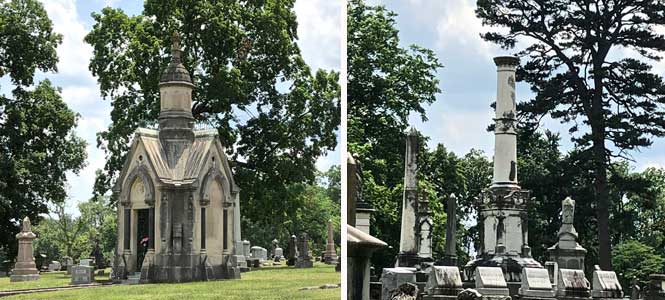
Adelicia;s mausoleum at Mt. Olivet Cemetery where here first 2 husbands and several children are buried. OBH, Sarah and other family members are around this monument nearby.
See Also: BELMONT MANSION (http://www.belmontmansion.com/); WILLIAM A. CHEATHAM; ISAAC FRANKLIN; SLAVERY
http://www2.volstate.edu/cbucy/Tennessee%20Materials/womensguide.htm
Adelicia Hayes Franklin Acklen Cheatham - Nashville (1817-1887)
Adelicia Acklen was a resourceful and shrewd business woman who was not defeated by the Civil War. She was born in Nashville and was the daughter of one of the city's most highly educated men, Oliver Bliss Hayes, who had moved to the city from Massachusetts. As a child, Adelicia was required to learn 5 languages.
Adelicia Hayes' first marriage was to Isaac Franklin, a wealthy, 50 year old bachelor from Gallatin, Tennessee, who owned 6 cotton plantations in Louisiana and more than 600 slaves. The Franklins had 4 children, but all of them died before reaching the age of 14. Franklin only lived seven years after their marriage; with his death Adelicia became the wealthiest woman in the United States, with much land as well as money.
Shortly before the Civil War, Adelicia married Joseph Acklen, a Nashville lawyer who had been a cavalry officer during the Mexican War. When the Civil War came, the Acklens played both sides of the conflict. Although they continued to live in their Nashville home, Belmont, they sent their youngest son Claude to military school in New Jersey. Joseph Acklen was described as a "shrewd businessman" who assisted his wife in managing her property, but he died after developing pneumonia while in Mississippi trying to sell the cotton crop. The Confederacy had confiscated the Acklens' land, but the Acklens had still hoped to sell their cotton crop to England rather than give it to the Confederate army.
After the death of Joseph Acklen, Adelicia herself went to Mississippi to attempt to obtain the release of her cotton crop from the Confederacy. Within a week she had found a Confederate general who would release the crop and a ship's captain who would try to run the Union blockade to take the cotton to England where it could be sold for profit. One ship load of Adelicia Acklen's cotton did break the iron-clad blockade of the Union Army and was sold in England for $900,000 in gold.
When Adelicia returned to Nashville after the war, she was a wealthy woman who had profited from the war. Again she married, but this final marriage was not successful and she eventually separated from her husband. She left Nashville and died in New York.
Adelicia Acklen is best known for her home in Nashville, the Belmont Mansion. Belmont was built as a summer home and patterned after an Italian villa. The extensive grounds and gardens included a zoo with a glass enclosed bird house for exotic birds from all over the world, a bowling alley, and a water tower. Belmont had running water throughout the house before the White House in Washington.
During the war, Adelicia managed to get 2800 bales of cotton, threatened with burning by the Union Army, through the blockade and sent to England where it was sold for almost $1million. The Rothschild bankers kept her money safe until she came to England after the war with her family to collect it and tour England and Europe. Here is a version of that story on the website History of American Women.
Adelicia's ghost is said to roam Belmont Mansion still. See http://www.tennessee.gov/tsla/exhibits/myth/ghosts.htm
Adelicia's Wikipedia page has a lot of references. A disappointment is the book They Were Her Property, White Women as Slave Owners in the American South by Stephanie Jones-Rogers where Adelicia merits only a single short mention as marrying Franklin, not running the plantations for twenty years.
Adelicia and Belmont Mansion are also the subject of a novel about the Civil War, Dinner At Belmont by Dr. Alfred Leland Crabb. (Amazon)
And more recently a historical fiction Adelicia: Grace, Grit and Gumption, by Joyce Blaylock (Amazon) – May 15, 2018 Joel
Joel's son Joel Addison Hayes married into a famous Southern family, Jefferson Davis became his father in law! Joel Addison Hayes, Jr. (1848-1919), a young banker from a Tennessee family, met Margaret Davis in Memphis in 1873, and they married there on New Year's Day of 1876. Jefferson and Varina Davis soon became fond of their only son-in-law. The young couple bore the Davises five grandchildren, four of whom lived to adulthood.
In 1885 the Hayes family moved to Colorado Springs because of Addison's health. There he became quite successful, rising to the presidency of the First National Bank. He served on the boards of other financial institutions and was one of the organizers and president of the state bankers' association.
Addison outlived his wife by ten years, dying in Los Angeles in 1919. He is buried with the Davises in Richmond's Hollywood Cemetery.
Photo: http://richmondthenandnow.com/Famous-People-Richmond-9.html
Children: http://www.beauvoir.org/history.html (picture halfway down page)
Jefferson Davis HAYES
Varina Howell HAYES
Lucy White HAYES
William Davis HAYES
From the “Confederate Veteran” June 1893
The picture of Mrs. Joel Addison Hayes, on cover page, will give pleasure to veterans. Strange as it may seem, many people had lost sight of her. This occurred through so much having been written about the very popular "Daughter of the Confederacy," while Mrs. Hayes, who married very young, has been largely occupied with family cares.
Mr. Hayes belongs to one of Nashville's oldest and wealthiest families, although he was born in Holly Springs, Miss., and was never much in Nashville. Two important streets, Addison and Hayes, are named for his family. He became a banker in Memphis at a very early age, and was successful from the beginning, but while on a trip in Mr. Davis' interest he took a severe cold which so affected his lungs that a change of climate became necessary, and he has for several years engaged in banking at Colorado Springs, Col., where he has been even more successful than at Memphis. In darker hours of adversity than the Southern people have knowledge, to Mr. Davis' family this son in law, ever ardently devoted, has been the strong arm of support. The first child of this union, named Jefferson Davis, died. There are four living, two daughters, named for their grandmothers, Varina Howell and Lucy White, the son, whose name has been changed by the Mississippi Legislature to Jefferson Hayes Davis, and little "Billie," the youngest grandchild, whose picture appears by the side of his mother, and who proudly claims to be "a Confegorate." The picture of Mrs. Hayes is an excellent likeness. While returning from Hollywood on burial day I happened near the carriage containing Mrs. Davis, Gov. McKinney, and Mr. and Mrs. Hayes, and although well acquainted with both for years, I made the mistake to greet the latter as "Miss Winnie." A lady devoted to Mrs. Hayes, and who knows her intimately, said this:
Richly gifted by nature in all fine qualities of mind and person, she reigns a social queen that high type of well bred women that has made our Southern land so famous. Not alone in the social world, however, does she please and charm by her fascinating womanly qualities, but in her home life, where the wife and mother adorns and beautifies her character. Unselfish, tender, and loving, she guards well the happiness intrusted to her keeping.
Jefferson Addison Hayes, changed his name to Jefferson Hayes-Davis.
Jefferson Addison HAYES-DAVIS (JEFFERSON HAYES DAVIS, of Colorado Springs, Col., son of Joel Addison and Margaret Howell (DAVIS) HAYES, of Colorado Springs. Adopted the surname of DAVIS in honor of his grandfather, the late Jefferson DAVIS, President of the Confederate States of America.
Bert Hayes-Davis, director of development for Pikes Peak Community Foundation, notes that Jefferson Davis' only married daughter, Margaret (1855-1909), moved to Colorado Springs with her husband, Joel Addison Hayes, in 1885. "All the direct descendents of Jefferson Davis claim Colorado Springs as their home," Hayes-Davis said. "Some of the family still reside in the Springs, including Barbara Webb, Michael Collins, Gerry and Chuck Bennett, and my family. Others that were related to Jefferson Davis include Mrs. James Sinton (Adele Hayes-Davis), Joel Addison Hayes, Jefferson Hayes-Davis, Marka Stewart, and Joel Addison Hayes Webb."
And from Louanne Van Pelt: "Jefferson Hayes-Davis of Colorado Springs was grandson to Jefferson Davis (one of Margaret's four children). I was told The Mississippi Legislature adjusted his name to the hyphenated Hayes-Davis in order to continue the name. I was this fine gentleman's secretary in 1950-51, when he was a vice president of the old First National Bank." A NOTE: The Peanuts comic strip character Lucy was modeled after lively Louanne Van Pelt, who sent us this information.
"Today marks Jefferson Davis' 200th birthday, and most people don't care. That really irks his greatgreat-grandson, Bertram Hayes-Davis. The Colorado Springs banker has devoted himself to getting the only president of the Confederacy his proper due and contends that his ancestor is given short shrift in history books and in the American mind."
http://www.tennessee.gov/tsla/history/manuscripts/mguide01.htm
Mf. 75 -- Hayes Family Papers, 1837-1882. 258 items. 1 reel. 35 mm.
This collection consists primarily of correspondence, accounts, legal documents, and memorabilia of the Hayes family of Davidson and Williamson counties. Correspondents include Oliver Bliss Hayes (1825-1868) of Williamson County, the son of Oliver Bliss Hayes (1783-1858), a prominent Nashville lawyer and later an ordained Presbyterian minister. The collection contains fourteen Civil War letters. One of these letters, dated 1863, mentions the death of Randal McGavock (1826-1863), an officer in the Confederate army; the letter also describes conditions in the North during the Civil War.
Also good reading: McGAVOCK-HAYES FAMILY PAPERS 1784-1888 From TN Archives
http://www.tennessee.gov/tsla/history/manuscripts/findingaids/785.pdf
Isaac Franklin, The Slave Trade and More
As I was growing up on Nashville, I often heard the praises of Adelicia. Beautiful, Smart, Rich. Once I discovered that Adelicia's first husband, Isaac Franklin, was more than twice her age and possible the richest man in America, I wanted to know more. Two decades ago, not much information was available on Franklin, save he was the owner of the Angola plantation. But over the years, more information surfaced. He was born near where I grew up north of Nashville and where my father and I used to go fishing. He owned Fairvue Plantation which I had never heard of. Then in 2014, I picked up a copy of Ed Baptist's (Cornell, history) book The Half Has Never Been Told, Slavery and the Making Of American Capitalism.(1)
Ed Baptist's book tied together a lot of loose ends on the history of America's rapid rise as an economic power. Let's summarize it thusly: "America was built by slave labor on land stolen from the indigenous peoples, bankrolled by a combination of Northern, Southern, US Government and European financing and trade with England." The overall story told by The Half Has Never Been Told is a good place to start learning how America built it's power on cotton grown by slave labor and made into fabric by child labor in the factories of Lowell, MA. And, mind you, all this is well before the civil war.
In 2014, we had a business meeting in Lafayette, LA. We visited St. Francisville, LA, where Adelicia's first husband, Isaac Franklin, had over 8700 acres of plantations. Angola, the name for his plantations, is now the Angola State Penitentiary, but other plantations in the area are amazingly well preserved. Here are photos of the visit.
While in St. Francisville, we made contact with a historian at LSU who told us about a book written in 1938 and reprinted in 1968 called Isaac Franklin, Slave Trader and Planter of the Old South by Wendell Holmes Stephenson (2). After some searching on obscure used book sites, we found a copy (for $450!). This book and several more tell the story of how Franklin and his nephew Armfield created Franklin and Armfield, the biggest slave trading operation in the US, with offices in Alexandria, VA (on King St., now a historic landmark and museum), New Orleans, Natchez and major cities in the South. Their business was so big, they ran a fleet of ships transporting slaves instead or marching them overland as other slave traders did. Franklin became the richest man in America. Not only was he a slave trader, he was also into the sex trade according to recent correspondence quoted in another must-read book, Unrequited Toil by Calvin Schmerhorn(3), even running whorehouses around the south. before he married Adelicia, He had to ship off several of his slave mistresses and children. This was common behavior for the rich plantation owners and slaveholders.
Another book that has extensive narrative about Franklin, Adelicia and Joseph Acklen, even noting from President Polk's diary his attendance at Adelicia and Joseph Acklen's wedding, is America Slave Coast, A History of the Slave-Breeding Industry, (4) Ned and Constance Sublette. Highly recommended, with more than a dozen stories about Franklin.
Books on slavery that mention Franklin's business, plantations, Adelicia, etc. (I'll give you the links to the books on Amazon to find out more)
1. The Half Has Never Been Told, Slavery and the Making Of American Capitalism, Edward E. Baptist. (on Amazon)
2. Isaac Franklin, Slave Trader and Planter of the Old South by Wendell Holmes Stephenson, 1938, 1969. (on Amazon, 1 copy, now $1200!)
3. Unrequited Toil by Calvin Schmerhorn (on Amazon)
4. America Slave Coast, A History of the Slave-Breeding Industry, Ned and Constance Sublette. (Amazon) Highly recommended, more than a dozen stories about Franklin.
5. A Troublesome Commerce, Robert H. Gudmestad (Amazon)
Books that mention Franklin I have yet to completely read:
Slavery's Capitalism, Sven Beckert and Seth Rockman (Amazon) (several mentions)
They Were Her Property, White Women as Slave Owners in the American South by Stephanie Jones-Rogers (Amazon) Adelicia merits only a single short mention as marrying Franklin, not running the plantations for twenty years.
Accounting For Slavery, Caitlin Rosenthal (Amazon) Reads just like an accounting book, if you know what I mean.
SLAVE TRADERS AND PLANTERS IN THE EXPANDING SOUTH: ENTREPRENEURIAL STRATEGIES, BUSINESS NETWORKS, AND WESTERN MIGRATION IN THE ATLANTIC WORLD, 1787-1859, Dissertation by Tomoko Yagyu, UNC Chapel Hill, 2006. Online
And if you want to read about the Antebellum Plantation Life from someone who grew up on a plantation on the North Carolina coast, you can get a reproduction of a late 19th century book called The Old Plantation: How We Lived in Great House and Cabin Before The War – James B Avirett available on Amazon. This book is classic Southern whitewashing of the slave era - think Gone With The Wind.
